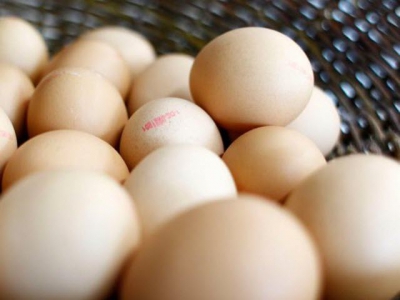Waste eggshells repurposed as sustainable energy storage

Chicken eggshells might be used in low-cost lithium-ion capacitor.
Eggshells consist of porous calcium carbonate that is highly suited for use in electrochemical storage systems.
Animal agriculture was built on repurposing leftover products from other industries, and now new research is demonstrating how an agricultural waste can support another industry.
Biowaste in the form of chicken eggshells has proved to be very effective for energy storage, according to an international team of researchers that includes scientists with the Helmholtz Institute Ulm (HIU) established by the Karlsruhe Institute of Technology (KIT) in Germany.
In the journal Dalton Transactions of the Royal Society of Chemistry, the researchers reported on the sustainable storage material that might be used in a low-cost lithium-ion capacitor, according to an announcement from KIT.
Chicken eggs are used in large quantities worldwide in the food, pharmaceutical and manufacturing industries, but after the eggs are used, the shells are typically discarded and disposed of as biowaste in landfills, KIT said.
Eggshells consist of a composite of calcium carbonate and a protein-rich fiber membrane.
“Surprisingly, there are constantly new examples in which natural substances are found to be suited well or even very well for producing materials for electrochemical storage systems,” HIU professor Maximilian Fichtner said.
Together with Australian colleagues, Fichtner discovered the promising electrochemical properties of chicken eggshells, which are able to store lithium thanks to their large proportion of calcium carbonate. Fine eggshell powder was used as an electrode against a metallic lithium anode in a non-aqueous electrolyte. The test cell was found to maintain an excellent capacity retention of 92% over more than 1,000 charge and discharge cycles, KIT said.
Both the calcified shell and the inner and outer shell membranes were used. The researchers washed, dried and crushed the sells to a powder to obtain a conductive material, the announcement explained.
So far, eggshell waste has been used in a number of applications, including bioceramics, cosmetics and the dye industry. The protein-rich, fibrous eggshell membrane has been applied as a separator in supercapacitors, but for the first time worldwide, biowaste has now been used as an electrode, KIT said.
Now, further research and a detailed understanding of the electrochemical and physical behavior of the material are needed to improve its performance and enable widespread use, the researchers said.
Related news
 Superdosing phytase in maize-based diets may boost nutrient use
Superdosing phytase in maize-based diets may boost nutrient use Increasing levels of phytase past feed formula recommendations may improve birds’ ability to use dietary nutrients in maize-based feeds, say researchers.
 US chicken producers call for equity in RFS talks
US chicken producers call for equity in RFS talks Chicken producers ask for consideration as the EPA considers changing ethanol policy in ways that could increase prices for feed corn
 Genetic study to investigate how flu jumps species
Genetic study to investigate how flu jumps species New study will identify genes that reduce influenza A infection in pigs and chickens as well as genes that limit virus spread to people.